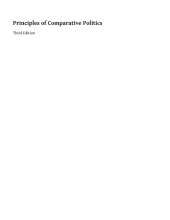The cultural determinants of democracy and dictatorship - Does democracy require a civic culture?
6 important questions on The cultural determinants of democracy and dictatorship - Does democracy require a civic culture?
A civic culture refers to:
Gabriel Almond and Sidney Verba recognized the importance of economic development for democracy, however they believed that only a civic culture could provide the 'psychological basis of democratization'. The attitudes within the civic culture includes:
- the belief on the part of individuals that they can influence political decisions
- positive feelings towards the political system
- high levels of interpersonal trust
- preferences for gradual societal change
Robert Putnam argues that cultural norms affect the variation in economic and political performance exhibited by regional governments in Italy. For Putnam, the key to a civic culture was social capital, which refers to:
- Higher grades + faster learning
- Never study anything twice
- 100% sure, 100% understanding
Inglehart and Wezel (2005) claim that there are two major dimensions of cross-cultural variation in the world today:
- Countries exhibiting traditional values (emphasize the importance of religion, traditional family roles and deference to authority) or secular-rational values (less emphasis on these values).
- Countries exhibiting survival values (emphasize the importance of physical and economic security) or self-expression values (emphasize the importance of gender racial and sexual equality; environmental protection; tolerance of diversity and life satisfaction).
According to Inglehart and Wezel, the modernization process is not linear, but it occurs in two distinct phases:
- The industrialization phase: countries move from traditional values to secular-rational values. The modernization process, is in this sense a secularization process.
- The post-indutrialization phase: countries move away from survival values to self-expression values, resulting in political liberalization, greater emancipation and a greater say in how political and economical decisions are made.
Blair (2015) describes four basic methods for addressing sensitive topics with surveys:
- Focuses on survey administration: adopt practices that build trust with the respondents
- Involves the use of randomized response techniques: the introduction of a randomizing device, such as a coin or a die, into the survey response process to guarantee the confidentiality of individual responses.
- Involves the use of list experiments.
- Involves the use of endorsement experiments: to protect the confidentiality of individual responses by mixing attitudes toward a sensitive political actor with attitudes toward one or more policies.
The question on the page originate from the summary of the following study material:
- A unique study and practice tool
- Never study anything twice again
- Get the grades you hope for
- 100% sure, 100% understanding
































